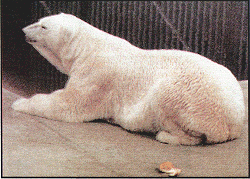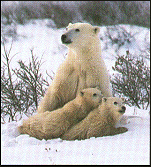How can we bear animals in zoos?
 |
| Pitiful: The polar bear in Flamingo Land in Yorkshire. |
A weekly appreciation of nature.
 |
QUESTION: Are polar bears an endangered species? Answer: No.
So why on earth do we insist on caging them in concrete mausoleums guaranteed
to send them stir crazy? Look at the picture here and weep. Some moron had
thrown an orange into the bear and the bear had mauled its way into the fruit,
more out of curiosity than hunger, before slumping back down onto the concrete
once more.
We came upon the Marcus and Mandy enclosure during our summer trip to the
coast when we visited the Flamingo Land theme park near Pickering.
A large poster informed visitors that the iron fence which splits the pool
was placed there to prevent the beasts fighting and it also told us at great
length why one of them died.
 The chances are the bears were bred in captivity and this
would be the excuse the establishment would use for keeping them and displaying
them in this fashion. However, if zoos are going to play the game of captive
breeding, using the notion of 'ensuring a species survival' then they should
be prepared to 'train them' for release into the wild, or not keep them at
all.
The chances are the bears were bred in captivity and this
would be the excuse the establishment would use for keeping them and displaying
them in this fashion. However, if zoos are going to play the game of captive
breeding, using the notion of 'ensuring a species survival' then they should
be prepared to 'train them' for release into the wild, or not keep them at
all.
Of course this form of action would involve massive expenditure not to mention
time and expertise. In certain areas across the Arctic, the polar bear has
become almost like our urban fox - they are regularly seen around people's
bins and have become something of a nuisance and a danger to the locals.
People have been employed purely to sedate the bears before shipping them
a hundred miles north. The television more than ever brings the world's wildest
life into our front rooms and it is also possible to visit many wilderness
areas much more easily than ever before and the prices are coming down all
the time as 'eco operators' vie for clients. What do readers think, am I
overstating the case?
Anglers aim to sink poachers
POACHERS are on the prowl in Ashton, subjecting fish to cruel,
torturous deaths, says a concerned angler. Alvin Davies told a public meeting
he had found 'set lines' hidden in the undergrowth around Hurst Knoll pond.
Set lines are lengths of strong fishing line pegged out, hooked and baited
and left to catch fish. The poacher may only return days later to reel in
his catch which has been struggling on the line, he added. Mr Davies said
after the district assembly meeting: "It is a cruel way of taking fish because
they could be there several days.
"We have found four set lines recently. It was reported to the police. We
haven't had a problem since." Sgt John Davies, an Ashton community beat officer,
said: "As far as we know there have been no more occurrences. "Half the problem
was that the gates to the allotment area (which allows access to the pond)
had been demolished by a stolen car and not replaced.
Those are up again now." Mr Davies, chairman of Hurst anglers, revealed greedy
angling trophy- hunters were willing to pay hundreds of pounds for prize
catches. He added other local angling clubs had also been hit. Now he says
his anglers are taking no chances and are stepping up security around their
own pond, off Smallshaw Lane, and checking for holes in the perimeter fence.
Sgt Davies said no other clubs had reported a problem with poachers and added
hopefully the new gates at Hurst Knoll would help solve their worries.
[The Advertiser Sep14 2000]
End of fishing era
SIR - Re: Steve Hoyle's letter in which he referred to the
'end of an era' article (Readers views 26/2/98). He quotes: "There is a real
shortage of fishing waters in Tameside." |
Waterways can benefit
SIR - Re: the letter by DL Borrell (Readers' views 19/3/98)
|
My comment :It is interesting that Steve
Hoyle uses the ploy of saying that angler's money has been used to revamp
the waterways and that anglers are the eyes and ears of the Environment Agency
as if this justified killing an animal.It doesn't matter how much money you
spend Steve, you are still killing or torturing creatures.I'm quite sure
that if Hitler had said he had paid a lot of money for the upkeep of gas
chambers this would have gone no nowhere to justifying his actions.
As for the bears in zoos,Sean is quite right,we think we have a moral
responsibility to save species from extinction, if we hold such moral highground
we can't very well kill foxes or otherwise we'd be
hypocrites. If we do save species from extinction this is
"unnatural" since species should die in order
that "natural selection" should occur. If a case is made for saving a species
through some human requirement for preferring the animal to be kept on this
planet (ie because we damaged its environment) then zoos maybe places for
captive breeding programmes. What they should not be is jails for animals
not under threat of extinction or viewing houses for a curious public.
Some animals maybe able to live in such circumstances,but animals such as
polar bears are hunters and roam over hundreds of kilometres in their native
habitat. Keeping them in concrete pits is cruel and there is no justification,
save stopping them from becoming extinct - in which case they could be kept
in much better circumstances,and should not be baubles for humans to stare
at. I've visited a few zoos,and note that they vary markedly in quality of
upkeep and in the capacity to care for their animals.Some are excellent and
cater for the animal's welfare and environment and mental stimulation.
Because of speciesism,many people think animals
do not have thoughts or feelings. The type of behaviours that occur in
unstimulated animals,notably apes,bears,large cats
and parrots indicate that boredom is as incapacitating
to their mind as it is ours.
Rainer Maria Rilke (1875-1926)

THE PANTHER
His vision, from the constantly passing bars,
has grown so weary that it cannot hold
anything else. It seems to him there are
a thousand bars; and behind the bars, no world.
As he paces in cramped circles, over and over,
the movement of his powerful soft strides
is like a ritual dance around a center
in which a mighty will stands paralyzed.
Only at times, the curtain of the pupils
lifts, quietly--. An image enters in,
rushes down through the tensed, arrested muscles,
plunges into the heart and is gone.
(translated by Stephen Mitchell)
[As heard in "Awakenings"]
Links RSPCA | IFAW | Animal Planet | MAFF | Badger | Bear | Fox | Castle | Magpie | Cryptozoology | |